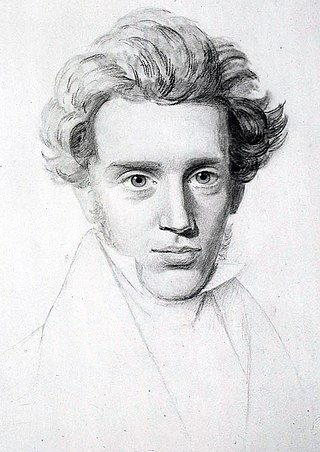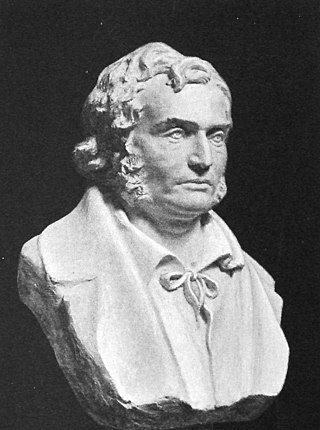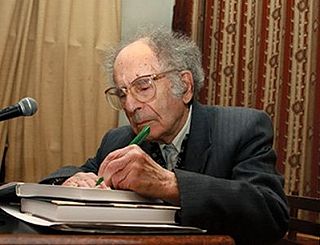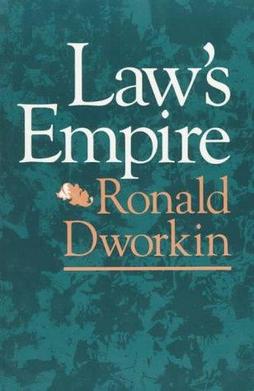Related Research Articles

Existentialism is a form of philosophical inquiry that explores the issue of human existence. Existentialist philosophers explore questions related to the meaning, purpose, and value of human existence. Common concepts in existentialist thought include existential crisis, dread, and anxiety in the face of an absurd world and free will, as well as authenticity, courage, and virtue.

Niels Henrik David Bohr was a Danish physicist who made foundational contributions to understanding atomic structure and quantum theory, for which he received the Nobel Prize in Physics in 1922. Bohr was also a philosopher and a promoter of scientific research.

Philosophy of law is a branch of philosophy that examines the nature of law and law's relationship to other systems of norms, especially ethics and political philosophy. It asks questions like "What is law?", "What are the criteria for legal validity?", and "What is the relationship between law and morality?" Philosophy of law and jurisprudence are often used interchangeably, though jurisprudence sometimes encompasses forms of reasoning that fit into economics or sociology.

Søren Aabye Kierkegaard was a Danish theologian, philosopher, poet, social critic, and religious author who is widely considered to be the first existentialist philosopher. He wrote critical texts on organized religion, Christianity, morality, ethics, psychology, and the philosophy of religion, displaying a fondness for metaphor, irony, and parables. Much of his philosophical work deals with the issues of how one lives as a "single individual", giving priority to concrete human reality over abstract thinking and highlighting the importance of personal choice and commitment. He was against literary critics who defined idealist intellectuals and philosophers of his time, and thought that Swedenborg, Hegel, Fichte, Schelling, Schlegel, and Hans Christian Andersen were all "understood" far too quickly by "scholars."

Harald Høffding was a Danish philosopher and theologian.

Poul Martin Møller was a Danish academic, writer, and poet. During his lifetime, he gained renown in Denmark for his poetry. After his death, his posthumously published fiction and philosophical writings were well received. He also devoted several decades of study to classical languages and literature. While serving as a professor at the University of Copenhagen, he was a mentor to the philosopher Søren Kierkegaard.

Ronald Myles Dworkin was an American legal philosopher, jurist, and scholar of United States constitutional law. At the time of his death, he was Frank Henry Sommer Professor of Law and Philosophy at New York University and Professor of Jurisprudence at University College London. Dworkin had taught previously at Yale Law School and the University of Oxford, where he was the Professor of Jurisprudence, successor to philosopher H. L. A. Hart.

Herbert Lionel Adolphus Hart was an English legal philosopher. He was the Professor of Jurisprudence at Oxford University and the Principal of Brasenose College, Oxford. His most famous work is The Concept of Law, which has been hailed as "the most important work of legal philosophy written in the twentieth century". He is considered one of the world's foremost legal philosophers in the twentieth century.
Robert Alastair Hannay is professor emeritus at the University of Oslo. Educated in Edinburgh and London, where he studied under A. J. Ayer and Bernard Williams and since 1961 resident in Norway. Hannay has written extensively on the writings of Søren Kierkegaard. His book "The Public" (2004) as well as examining the roles of the 'public' as audience and political participant, brings several Kierkegaardian insights to bear on contemporary political life. Hannay has written a novella (2020) and several pocket books on philosophical themes, as well as a memoir (2020). From 2006 to 2020 he was a member of the team translating Kierkegaard's complete journals and notebooks.
George Linsley Pattison is a retired English theologian and Anglican priest. His last post prior to retirement was as Professor of Divinity at the University of Glasgow. He was previously Lady Margaret Professor of Divinity at the University of Oxford. From 2017–2019 he was a Senior Co-Fund Fellow at the Max Weber Center at the University of Erfurt. He has also been an Affiliate Professor in Systematic Theology at the University of Copenhagen (2011–) and an Honorary Professor in the Faculty of Theology at the University of St Andrews (2021–).
The World Congress of Philosophy is a global meeting of philosophers held every five years under the auspices of the International Federation of Philosophical Societies (FISP). First organized in 1900, these events became firmly established after the Second World War. Each World Congress is sponsored by one of the member societies in a different country, which assumes responsibility for the organization of that Congress. The purpose of these events is to contribute to the development of professional relations between philosophers of all countries, promote philosophical education, and contribute to the impact of philosophical knowledge on global problems. The 24th World Congress of Philosophy was held in Beijing in August 2018. The 25th World Congress of Philosophy will take place in Rome in 2024.
Charles Stephen Evans is an American philosopher. He is one of the United States' leading experts on Søren Kierkegaard and has also published extensively on subjects including philosophy of religion and the relationship of psychology and Christianity. He is University Professor of Philosophy and Humanities at Baylor University.

Grigory Solomonovich Pomerants was a Russian philosopher and cultural theorist. He is the author of numerous philosophical works that circulated in samizdat and made an impact on the liberal intelligentsia in the 1960s and 1970s.

Søren Kierkegaard was a Danish philosopher whose influence and reception varied widely and may be roughly divided into various chronological periods. Reactions were anything but uniform, and proponents of various ideologies attempted to appropriate his work quite early.
This is a bibliography of works by and about the 19th-century philosopher Søren Kierkegaard.
Jon Stewart is an American philosopher and historian of philosophy. He specializes in 19th century Continental philosophy with an emphasis on the thought of Kierkegaard and Hegel. He has also worked in the field of Scandinavian Studies and has made the culture of the Danish Golden Age better known internationally. Stewart currently works as a researcher at the Institute of Philosophy at the Slovak Academy of Sciences.
Gerald Allan Cohen was a Canadian political philosopher who held the positions of Quain Professor of Jurisprudence, University College London and Chichele Professor of Social and Political Theory, All Souls College, Oxford. He was known for his work on Marxism, and later, egalitarianism and distributive justice in normative political philosophy.
Rae Helen Langton, FBA is an Australian-British professor of philosophy. She is currently the Knightbridge Professor of Philosophy at the University of Cambridge. She has published widely on Immanuel Kant's philosophy, moral philosophy, political philosophy, metaphysics, and feminist philosophy. She is also well known for her work on pornography and objectification.
Edward F. Mooney is an internationally recognized Kierkegaard scholar. A retired professor of religion and philosophy, he taught at Sonoma State University, Syracuse University, and in Israel at Haifa and Tel Aviv Universities. As president of the International Kierkegaard Society, he lectured at Vilnia, Frankfurt, Reykjavik, Jerusalem, Ber-Shiva, Tel Aviv, Dartmouth, Johns Hopkins, Auburn, and elsewhere. 2013–2015 he was visiting professor at Tel-Aviv and Hebrew University, Jerusalem, teaching seminars in American Studies on Thoreau. He received his B.A. in philosophy from Oberlin College (1962) and his M.A. and Ph.D. from The University of California, Santa Barbara (1968). His dissertation, written under Herbert Fingarette, linked philosophical themes in literature with the turn toward persons in the work of John Austin, Peter Strawson, and Iris Murdoch. He was professor of philosophy at Sonoma State University before moving to Syracuse. He has published books on Kierkegaard and several smaller studies on Stanley Cavell, Henry Bugbee, Bruce Wilshire, H. D. Thoreau, and others. He was president of the North American Kierkegaard Society for several years, in which capacity he lectured at Vilnia, Newcastle, Dartmouth, and elsewhere.

Law's Empire is a 1986 text in legal philosophy by Ronald Dworkin, in which the author continues his criticism of the philosophy of legal positivism as promoted by H.L.A. Hart during the middle to late 20th century. The book introduces Dworkin's Judge Hercules as an idealized version of a jurist with extraordinary legal skills who is able to challenge various predominating schools of legal interpretation and legal hermeneutics prominent throughout the 20th century. Judge Hercules is eventually challenged by Judge Hermes, another idealized version of a jurist who is affected by an affinity to respecting historical legal meaning arguments which do not affect Judge Hercules in the same manner. Judge Hermes' theory of legal interpretation is found by Dworkin in the end to be inferior to the approach of Judge Hercules.
References
- ↑ "Philosophy as Inquiry and Way of Life". International Federation of Philosophical Societies. Archived from the original on 10 March 2013. Retrieved 9 January 2013.
- ↑ "University of Copenhagen - SK2013". International Kierkegaard Society. Archived from the original on 31 January 2013. Retrieved 1 February 2013.
- ↑ Hodgson, Godfrey (14 February 2013). "Ronald Dworkin obituary". The Guardian. Retrieved 15 February 2013.
- ↑ Liptak, Adam (14 February 2013). "Ronald Dworkin, Scholar of the Law, Is Dead at 81". The New York Times. Retrieved 15 February 2013.
- ↑ "Philosopher, Cultural Theorist and Human Rights Legend Grigory Pomerants Passes Away". Russkiy Mir Foundation. Archived from the original on 17 April 2013. Retrieved 26 February 2013.